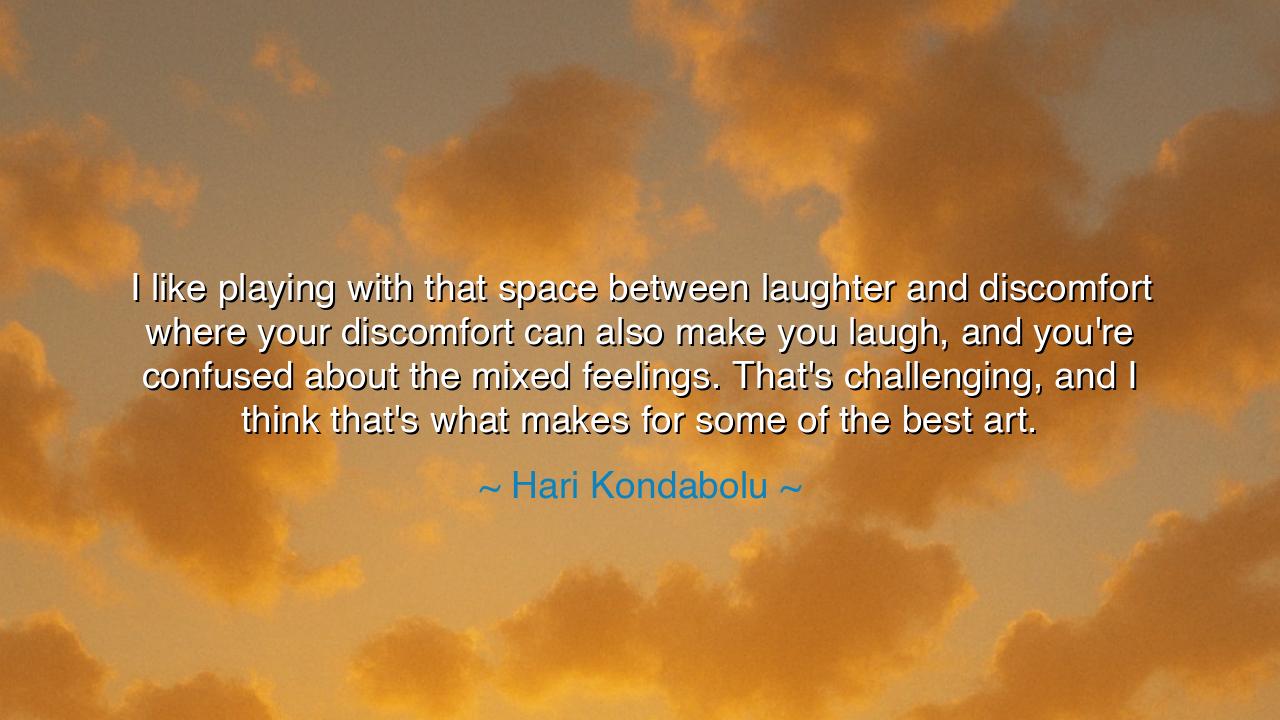
I like playing with that space between laughter and discomfort
I like playing with that space between laughter and discomfort where your discomfort can also make you laugh, and you're confused about the mixed feelings. That's challenging, and I think that's what makes for some of the best art.






O seekers of wisdom, listen closely to the words of Hari Kondabolu, a voice that challenges and provokes through the art of comedy: “I like playing with that space between laughter and discomfort where your discomfort can also make you laugh, and you’re confused about the mixed feelings. That’s challenging, and I think that’s what makes for some of the best art.” These words speak to the very essence of human emotion, of the complex and often contradictory nature of life itself. To play with the space between laughter and discomfort is to dance upon the edge of truth—to confront the rawness of existence and yet find humor in it, to challenge the boundaries of what is acceptable and what is not, all while maintaining the delicate balance of both discomfort and joy.
In the ancient world, art—whether in the form of theater, poetry, or sculpture—was a reflection of the human condition. The great playwrights of Athens, such as Sophocles and Aristophanes, used their works not just to entertain, but to provoke deep reflection, often straddling the line between humor and discomfort. Aristophanes, in particular, was known for his satirical plays that challenged the very foundation of Athenian society. He used laughter as a weapon to expose the flaws and hypocrisies of the time, often making the audience laugh while simultaneously making them uncomfortable with the truths they were forced to confront. In this way, he was a master of the space that Kondabolu speaks of—using humor to navigate the complex landscape of human emotions, turning discomfort into a catalyst for thought and change.
The concept of humor existing in that delicate space between laughter and discomfort is not a new one. Socrates, in his great dialogues, used humor to challenge the beliefs of his fellow Athenians. He would ask questions that made his listeners uncomfortable, yet in that discomfort, there was the potential for learning and growth. Socrates understood that to question the very nature of life, to laugh at the absurdity of human existence, was to reach a deeper understanding. His wit was never merely for amusement, but for enlightenment—a tool to pry open the soul and expose its contradictions. To laugh at something uncomfortable, to feel the unease of being forced to confront truth, was a sign of growth in the ancient world. It was a sign that one was willing to face the complexity of life and learn from it.
In more recent times, we see the power of humor in this same vein. Lenny Bruce, a comedian who lived on the edge of acceptable discourse, used humor to break down the barriers of societal norms. He would tell jokes that were uncomfortable—sometimes provocative, even offensive—but in doing so, he forced his audience to confront the realities of race, religion, and authority. He believed that comedy could expose the hypocrisy of society, and like Kondabolu, he was willing to challenge the space between laughter and discomfort, knowing that it was in that very space that the most profound reflections and insights could be found. His humor was not for entertainment alone, but for the purpose of shaking the audience from their complacency, urging them to question and to see the world through a different lens.
O children, the lesson here is profound: the best art, the most transformative art, is that which challenges us, that which takes us to the edge of discomfort and then asks us to laugh. It is comedy that forces us to acknowledge the absurdities of life, not by turning a blind eye to them, but by facing them head-on and finding humor in their paradoxes. Kondabolu teaches us that to create art that moves the soul is to embrace the complexities of human emotion, to navigate the delicate balance between joy and pain, between light and shadow. In that space, where we feel both unease and relief, where we are forced to reckon with our own contradictions, we find the deepest expressions of human truth.
So, O seekers, take this lesson into your own lives: do not shy away from the discomfort that life presents. Instead, walk boldly into it, for it is in that space between discomfort and laughter that you will find the true beauty of life. Art, in all its forms, is a reflection of this tension. Seek to create, to challenge, to push the boundaries of what is comfortable, and know that it is through this tension that you can bring about the most meaningful change—in your own heart, in your community, and in the world. Embrace the discomfort, find laughter in the absurdity, and you will see that in doing so, you not only learn more about yourself, but you also offer the world a gift—the gift of truth wrapped in humor.






AAdministratorAdministrator
Welcome, honored guests. Please leave a comment, we will respond soon